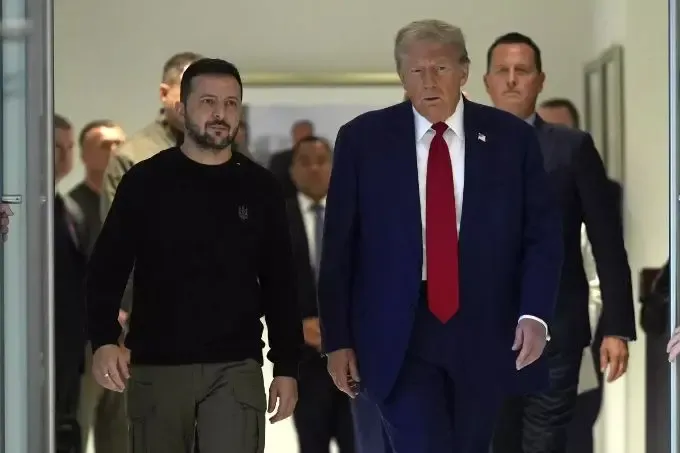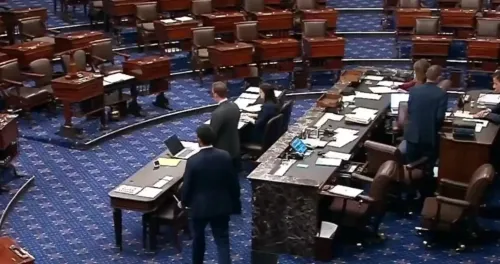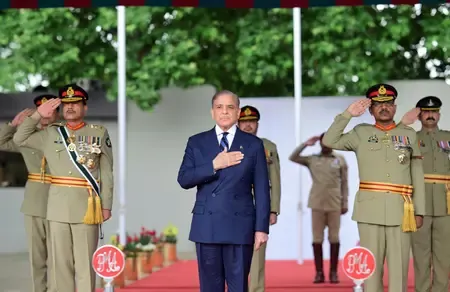Zelensky Hits Back at Trump's Rating Claims, Accuses Him of Disinformation

Synopsis
Key Takeaways
- Zelensky counters Trump's claim of low ratings.
- 57% of Ukrainians trust Zelensky as per a recent poll.
- Kellogg emphasizes negotiations with Ukraine's leaders.
- US and Russia plan further consultations on Ukraine.
- Focus on improving diplomatic relations between the US and Russia.
Kyiv, Feb 19 (NationPress) Shortly after US President Donald Trump claimed that Volodymyr Zelensky possesses a 4 percent approval rating, the Ukrainian leader retorted on Wednesday, asserting that Trump is existing in a disinformation space.
“Regrettably, President Trump, whom we hold in high regard as the leader of the American populace, inhabits this disinformation space,” Zelensky remarked to journalists in Kyiv.
Local outlets in Kyiv also pointed to a survey conducted from February 4 to 9, released following Trump’s remarks, to showcase Zelensky's enduring popularity.
“Approximately 57 percent of Ukrainians trust President Volodymyr Zelensky as of February, reflecting a rise of five percentage points since December, according to a poll by the Kyiv International Institute of Sociology (KIIS) published on February 19... The recent survey indicates that Zelensky continues to maintain the support of the majority of Ukrainians, even showing a slight uptick in trust after a year of consistent popularity decline throughout 2024,” reported the Kyiv Independent on Wednesday.
Interestingly, Keith Kellogg, the US Special Envoy for Ukraine and Russia, has also arrived in Kyiv on Wednesday and is slated to meet with Zelensky shortly.
The Ukrainian media quoted Kellogg as referring to his visit as “an opportunity for fruitful negotiations.”
“Part of my mission is to listen before returning to the United States to brief President Donald Trump,” Kellogg reportedly stated.
He also underlined that the United States acknowledges the significance of security guarantees for Ukraine.
Zelensky's sharp remarks came less than a day after senior officials from Russia and the United States engaged in discussions lasting nearly five hours in Riyadh, Saudi Arabia, on Tuesday.
Both nations indicated that they would soon announce teams to negotiate a resolution to the war in Ukraine, while also ensuring the “earliest possible appointment” of ambassadors in both Moscow and Washington.
“Russia and the United States will conduct regular consultations on Ukraine after both sides designate negotiating teams,” Russian Foreign Minister Sergei Lavrov stated during a press briefing following the Riyadh talks with US officials.
A gathering of deputy foreign ministers is expected to be scheduled soon to “remove barriers” to embassy operations, Lavrov mentioned after discussions with US Secretary of State Marco Rubio, National Security Advisor Mike Waltz, and US Special Envoy to the Middle East Steve Witkoff.
On the Russian side, key political, intelligence, and economic figures were present, including Yuri Ushakov, the Kremlin's foreign affairs advisor.
“The first is likely the most pressing and certainly not the most challenging. This is to secure the earliest possible appointment of Russian ambassadors to the United States and US ambassadors to Russia. To eliminate the obstacles that have been primarily established under the administration of [former US President Joe] Biden, which significantly complicated the functioning of our diplomatic missions,” Lavrov was cited by Russia’s state-owned Tass news agency while detailing the agreements reached during the meeting.
Lavrov conveyed that the deputy heads of the diplomatic departments from both nations “will agree to convene in the very near future and assess the necessity to eradicate these artificial barriers in the operations of embassies and other foreign institutions of Russia in the United States and the United States in Russia.”
During these interactions, he stated that senior diplomats must not solely focus on “the specific manifestations of these obstacles, but will attempt to approach them systematically to permanently resolve these inconveniences that genuinely hinder the development of normal everyday relations.”









